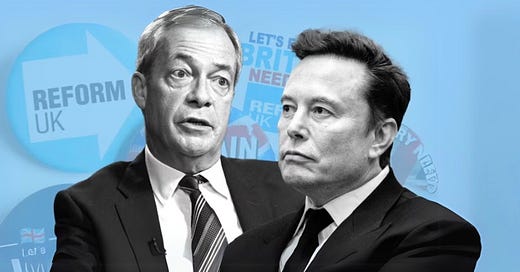Nigel Farage, the perennial political disruptor, finds himself navigating treacherous terrain as leader of Reform UK. From championing Brexit to rebranding the UK Independence Party, Farage has repeatedly demonstrated his ability to galvanize public opinion and challenge the status quo. His crusade against the grooming gang crisis—a scandal implicating primarily Pakistani men in widespread, systemic abuse—demands courage and precision. But the UK is not the United States, where First Amendment protections shield even the most controversial speech. In Britain, the wrong tweet can lead to a knock on the door from law enforcement. As Elon Musk critiques Farage for his cautionary distance from figures like Tommy Robinson, it’s worth exploring why Farage must tread so carefully—and why Musk might reconsider his critique.
The Grooming Gang Scandal: Britain’s Shameful Open Secret
Farage’s vocal stance on grooming gangs addresses a tragedy that has persisted for decades, shielded by political correctness and media obfuscation. These crimes, involving the systemic exploitation of vulnerable young girls by predominantly Pakistani networks, were too often ignored by authorities for fear of being labeled racist. Farage’s call for a national inquiry cuts through this cowardice, offering hope to victims long betrayed by the state.
Yet addressing this issue without falling into the traps of extremism requires finesse. Figures like Tommy Robinson, while correct in their criticism of the government’s inaction, carry baggage that Farage cannot afford to shoulder. Robinson’s controversial statements, including racially charged rhetoric, and his legal troubles, such as repeated violations of court orders, have rendered him a lightning rod for criticism. Aligning with such a figure risks overshadowing Farage’s message and alienating the moderate voters essential to building a broad coalition. Robinson’s fiery rhetoric and legal troubles—including defiance of questionable court orders—make him a divisive figure, akin to Milo Yiannopoulos or Nick Fuentes in the U.S. Farage understands that aligning with such polarizing personalities risks alienating moderate voters essential to his movement.
The British Political Context: A Land Without First Amendment Protections
The UK’s legal landscape makes Farage’s caution not just prudent but necessary. Unlike in America, where free speech is sacrosanct, Britain’s hate speech laws are as nebulous as they are draconian. For instance, individuals have been arrested for tweets or Facebook posts deemed offensive under these laws, exemplifying the precarious balance between speech and state authority in the UK. Supporting the “wrong” person or expressing the “wrong” opinion can lead to criminal charges. This is not an environment where alliances with controversial figures can be shrugged off as mere free speech advocacy. Farage’s ambition to build a broad-based, national party demands that he avoid any association that could derail his mission.
Musk, a champion of free speech in the digital age, might struggle to grasp the nuances of this environment. While his actions at X reflect a commendable commitment to open discourse, Britain’s political minefield demands a different kind of navigation. Farage’s refusal to embrace Robinson isn’t cowardice; it’s strategy.
Reform and Restraint: Farage’s Balancing Act
Farage’s track record proves his ability to effect change. From leading the Brexit movement—which saw a historic 52% of Britons vote to leave the EU in 2016—to reshaping the UK Independence Party into a formidable political force, his political instincts are sharp. His focus on ending the grooming gang scandal reflects his commitment to justice and reform. Deporting the guilty and dismantling networks that prey on children is a righteous cause, and Farage has made it central to his platform.
But Farage understands that success depends on coalition-building. To lead Britain, he must attract voters across ideological and demographic divides. This is no easy task in a country where much of the electorate remains uninformed or skeptical about the grooming gang issue, thanks to the willful blindness of state-run outlets like the BBC. By distancing himself from Robinson, Farage ensures that his message remains palatable to a wider audience, avoiding the pitfalls of association with figures seen as extremists.
The Musk Factor: Why Grace Matters
Elon Musk, an outsider to the intricacies of British politics, should extend Farage some grace. While Musk’s instincts for free speech and justice align with Farage’s goals, the pathways to achieving them differ greatly across the Atlantic. Musk’s own reluctance to ally with figures like Fuentes or Yiannopoulos demonstrates an understanding of the dangers of guilt by association—a principle Farage applies in distancing himself from Robinson.
Moreover, Farage’s willingness to address the grooming gang crisis—a subject many British politicians dare not touch—deserves recognition. His courage in taking on this issue, combined with his strategic restraint, positions him as a leader worth supporting. Musk’s resources and platform could amplify Farage’s reformist message, whether through targeted social media campaigns to raise awareness of his policies or financial backing to bolster Reform UK’s outreach efforts. Such support would aid a cause that aligns with their shared commitment to justice and accountability.
Conclusion
Nigel Farage’s path is fraught with challenges, from a hostile media to a legal system that stifles dissent. Yet his commitment to addressing the grooming gang scandal and reforming Britain’s political landscape demonstrates a rare blend of courage and pragmatism. Elon Musk, as a champion of free speech and reform, should recognize the constraints Farage faces and offer him support rather than criticism. Reforming a nation requires both boldness and balance, and Farage—walking his tightrope with measured resolve—is proving himself capable of both.
If you don't already please follow @amuse on 𝕏 and subscribe to the Deep Dive podcast.





